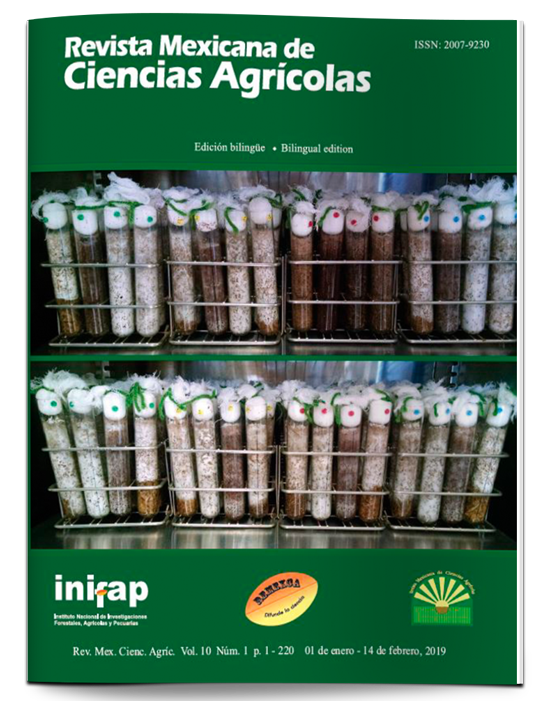Mycelial colonization of Flammulina mexicana from solid and liquid inoculum in agroforestry residues
DOI:
https://doi.org/10.29312/remexca.v10i1.376Keywords:
corn stubble, growth speed, pellets, primordia, wheat.Abstract
The production of inoculum is a process that requires its optimization, since, to a great extent, it depends on generating a greater biological efficiency in the cultivation of mushrooms, reducing the economic costs, as well as problems of contamination and time in the cultivation cycles. In the present investigation, during 2016, the colonization of four substrates was evaluated (corn stubble, Quercus sp. sawdust, Senecio cinerarioides sawdust and maize stubble in combination with S. cinerarioides sawdust) with liquid and solid inoculum of F. mexicana (strains IE 974, IE 984, IE 985, IE 986). As results, it was obtained that the colonization rate of the different substrates varied among the four strains (p≤ 0.0001). Substrates with solid inoculum showed lower growth rates compared to liquid inoculum, substrates with liquid inoculum were colonized in a period of 17 days and with solid inoculum took 50 days and in some cases, there were parts that were not colonized; which was also related to the substrate used, presenting an interaction (p≤ 0.0001) between the type of inoculum and the substrate that affects the growth rate. The incorporation of liquid inoculum in the cultivation of fungi allows to increase the density and speed of mycelial growth, as well as the early appearance of primordia, which contributes to reduce the time in the cultivation cycle.
Downloads
Downloads
Published
How to Cite
Issue
Section
License
The authors who publish in Revista Mexicana de Ciencias Agrícolas accept the following conditions:
In accordance with copyright laws, Revista Mexicana de Ciencias Agrícolas recognizes and respects the authors’ moral right and ownership of property rights which will be transferred to the journal for dissemination in open access. Invariably, all the authors have to sign a letter of transfer of property rights and of originality of the article to Instituto Nacional de Investigaciones Forestales, Agrícolas y Pecuarias (INIFAP) [National Institute of Forestry, Agricultural and Livestock Research]. The author(s) must pay a fee for the reception of articles before proceeding to editorial review.
All the texts published by Revista Mexicana de Ciencias Agrícolas —with no exception— are distributed under a Creative Commons License Attribution-NonCommercial 4.0 International (CC BY-NC 4.0), which allows third parties to use the publication as long as the work’s authorship and its first publication in this journal are mentioned.
The author(s) can enter into independent and additional contractual agreements for the nonexclusive distribution of the version of the article published in Revista Mexicana de Ciencias Agrícolas (for example include it into an institutional repository or publish it in a book) as long as it is clearly and explicitly indicated that the work was published for the first time in Revista Mexicana de Ciencias Agrícolas.
For all the above, the authors shall send the Letter-transfer of Property Rights for the first publication duly filled in and signed by the author(s). This form must be sent as a PDF file to: revista_atm@yahoo.com.mx; cienciasagricola@inifap.gob.mx; remexca2017@gmail.
This work is licensed under a Creative Commons Attribution-Noncommercial 4.0 International license.



